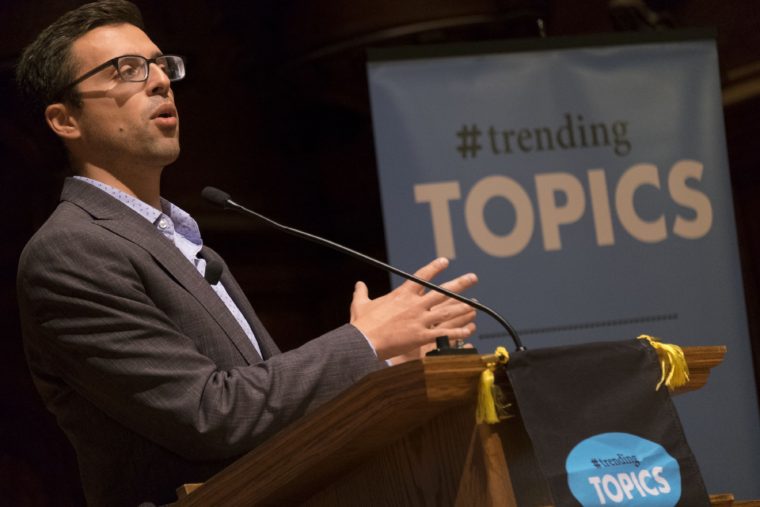No matter who wins Nov. 8, the next president will inherit a broken system of government.
That was political journalist Ezra Klein’s sobering, if delightfully delivered, message at Graham Chapel Tuesday evening where he kicked off Student Union’s Trending Topics Series. The event was sponsored by Washington University Political Review.
“Someone is going to win this thing, and then they are going to have to govern,” Klein said. “I don’t know how they’re going to do that.”
Klein is founder and editor of Vox.com, a website that distills complex issues like the Syrian conflict, the Affordable Care Act and the American primary system into compelling graphics, videos and stories. He told students that American voters should focus less on the candidates and more on the structure of our democracy. The primary process, gerrymandering, Congressional rules of order — all of these factors and more are undermining our government.
“It’s hard to see the optimism,” Klein said. “We have heard from voters that this is a uniquely bad point. It isn’t. Consumer confidence is at one of its highest points. We have unemployment under 5 percent, the longest period of private sector job growth on record, the deficit has come down substantially. If you step back, this actually looks pretty good. And yet our politics is barely able to manage this. What happens [when] things begin to break down?”
Here are four problems that give Klein pause:
We don’t know how to talk about the uncomfortable stuff.
“This country is undergoing a rapid demographic change, and we don’t have a language for it. We’ve created a discussion that doesn’t have room for anxiety. Trump might be defeated, but that doesn’t mean the resentments are going to go away. There has to be some better way to have the dialogue.”
We have to change campaign finance laws, but the alternative may not be much better.
“I would like to see something much closer to public funding or high levels of small-donor matching. But small donors are often more polarized than large donors. When you look at the candidates who are the biggest small-donor fundraiser like Michele Bachmann, you tend to see people who are polarizing the system. Still, a reformed campaign finance system would restore trust in the American electoral system. People shouldn’t believe their system is bought.”
A seized Congress has ceded its power.
“Gridlock is not a great term for when the system seizes in the way it does. I went to UCLA, and we have a lot of gridlock in Southern California, and what I can tell [you] is that when you have gridlock, it’s not that you don’t go anywhere, it’s that you take a lot of screwy side streets to get through the system. That’s happening a lot. Congress, by far, is the most powerful branch of government. But when Congress can’t act, the system begins to push responsibility elsewhere. Climate change regulation is done by the EPA. Immigration policy is done by executive order and then court order. That’s not the way it should be going.”
Polarization is here to stay.
“Polarization has a flying wheel quality to it. The more you polarize, the more you can polarize. We couldn’t have a Fox News or an MSNBC 50 years ago. All of these institutions make people angrier and angrier and angrier. You are seeing that becoming a much more palpable form of identity. And the more it becomes part of their identity, the more it structures what sorts of music they listen to, where they live, the more entrenched it becomes.”
